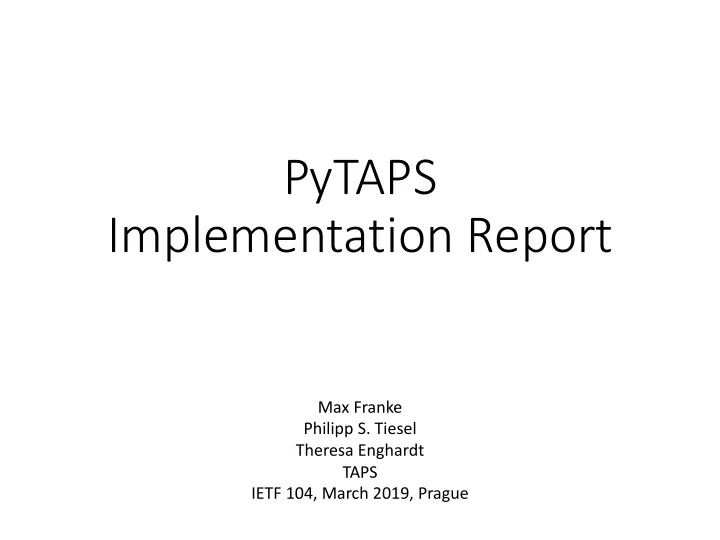

PyTAPS Implementation Report Max Franke Philipp S. Tiesel Theresa Enghardt TAPS IETF 104, March 2019, Prague
PyTAPS Principles • Keep as close to the interface draft as possible • Integrate with Python asyncio framework • Build A Fully asynchronous API using coroutines PyTAPS – TAPS – Max Franke – IETF 104 2
Implementation status • What works so far • TCP, UDP, TLS (1.3) • Candidate selection for protocols • What we want to do next: • Framers • Interface selection • Pooled connections • QUIC • Racing PyTAPS – TAPS – Max Franke – IETF 104 3
Minimal Server Minimal Client 4
Things that work well • TAPS API seems easy and mostly intuitive to use • Ability to swap protocols without changing application code • Minimize protocol specific code in the implemenation PyTAPS – TAPS – Max Franke – IETF 104 5
Things that we have noticed: Defaults • Recommended default properties too restrictive • Lack of specified properties indicates lack of constrains the app has for connections • Should have the highest amount of possible candidates to make sure a connection can be established • So why force us on TCP then?! PyTAPS – TAPS – Max Franke – IETF 104 6
Things that we have noticed: Hard to force a specific protocol • Dependencies of transport properties make it unintuitive to change to a specific protocol • To change to UDP, application has to fiddle with at least 3 properties • Makes API harder to use for these cases PyTAPS – TAPS – Max Franke – IETF 104 7
Things we have noticed: Handling unsatisfiable configuration • When to check for unsatisfiable configurations? • Check it every time a property gets set à possibly lots of errors • Check it only after initiate/listen has been called à works, but possibly too late • Address/Discuss in Implementation draft? • Application can not distinguish between unsatisfiable configuration and network issues à Should have its own error type PyTAPS – TAPS – Max Franke – IETF 104 8
Things we have noticed: Properties • Hard to tell which protocol satisfies what property • Does UDP satisfy the 0RTT property? • How to treat optional features? • Just turn them on/off accordingly? • What happens if we can’t turn them on/off reliably? v If multistreaming is prohibited should SCTP be excluded? PyTAPS – TAPS – Max Franke – IETF 104 9
Things that we have noticed: Miscellaneous • Interaction between multiple receives and min_incomplete_length • Having to call receive for each incoming messages can be inconvenient • msgref is never clearly defined, only appears in callbacks in interface draft PyTAPS – TAPS – Max Franke – IETF 104 10
PyTAPS – TAPS – Max Franke – IETF 104 11
Recommend
More recommend